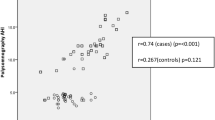Abstract
Introduction
Hormonal and physical changes during pregnancy are associated with some sleep-related breathing disorders (SRBD) such as snoring and sleep apnea, and SRBD are associated with recurrent episodes of oxyhemoglobin desaturation and increased sympathic activity. We aimed to search the incidence of self-reported snoring and witnessed apnea in the third trimester of pregnancy and to analyze their influence on fetal outcome and gestational hypertension (GH).
Methods
Two hundred pregnant women (group 1) during their stay for labor and 200 age-matched control women (group 2) were included in the study. All patients were asked to complete a detailed questionnaire that covers demographic features. We measured neck circumference and performed Epworth sleepiness scale (ESS) to determine excessive daytime sleepiness in all patients.
Results
The mean age was 27.4 ± 6.7 and 26.3 ± 5.8 for group 1 and 2, respectively. Habitual snoring was detected only in group 1 in 5 patients; 36 pregnant women and 7 control patients reported occasional snoring. Both habitual and occasional snoring was significantly observed to be increased in pregnancy. Witnessed sleep apnea was been observed only in 1 patient in group 1. The mean neck circumference was 37.4 ± 3.2, 35.1 ± 2.1 cm and ESS was 6.7 ± 3.01, 5.1 ± 2.1 for group 1 and 2, respectively (p < 0.05). There was no significant correlation between snoring and GH. There was no significant relationship between all investigated parameters and fetal outcome. We found that excessive weight gain during pregnancy is significantly associated with snoring.
Conclusion
We concluded that, although pregnant women, especially who gain excessive weight during their pregnancy, significantly snore more than nonpregnant women, this did not affect fetal outcome.

Similar content being viewed by others
References
Partinen M, Gislason T (1995) Basic Nordic Sleep Questionnaire (BNSQ): a quantitated measure of subjective sleep complaints. J Sleep Res 4(S1):150–155
Gislason T, Almqvist M, Eriksson G, Taube A, Boman G (1988) Prevalence of sleep apnea syndrome among Swedish men—an epidemiological study. J Clin Epidemiol 41(6):571–576
Young T, Palta M, Dempsey J, Skatrud J, Weber S, Badr S (1993) The occurrence of sleep-disordered breathing among middle-aged adults. N Engl J Med 328:1230–1235
Venkata C, Venkateshiah SB (2009) Sleep-disordered breathing during pregnancy. J Am Board Fam Med 22(2):158–168
Contreras G, Gutiérrez M, Beroíza T, Fantín A, Oddó H, Villarroel L, Cruz E, Lisboa C (1991) Ventilatory drive and respiratory muscle function in pregnancy. Am Rev Respir Dis 144(4):837–841
Champagne K, Schwartzman K, Opatrny L, Barriga P, Morin L, Mallozzi A, Benjamin A, Kimoff RJ (2009) Obstructive sleep apnoea and its association with gestational hypertension. Eur Respir J 33(3):559–565
Sulit L, Storfer-Isser A, Kirchner HL, Redline S (2006) Differences in polysomnography predictors for hypertension and impaired glucose tolerance. Sleep 29(6):777–783
Narkiewicz K, Wolf J, Lopez-Jimenez F, Somers VK (2005) Obstructive sleep apnea and hypertension. Curr Cardiol Rep 7(6):435–440
Johns MW (1993) Daytime sleepiness, snoring, and obstructive sleep apnea. The Epworth Sleepiness Scale. Chest 103(1):30–36
Verdaguer M, Levrat V, Lamour C, Paquereau J, Neau JP, Meurice JC (2008) Obstructive sleep apnoea syndrome (OSAS) in women: a specific entity? Rev Mal Respir 25(10):1279–1288
Ursavas A, Karadag M, Nalci N, Ercan I, Gozu RO (2008) Self-reported snoring, maternal obesity and neck circumference as risk factors for pregnancy-induced hypertension and preeclampsia. Respiration 76(1):33–39
Franklin KA, Holmgren PA, Jönsson F, Poromaa N, Stenlund H, Svanborg E (2000) Snoring, pregnancy-induced hypertension, and growth retardation of the fetus. Chest 117(1):137–141
Gislason T, Benediktsdóttir B, Björnsson JK, Kjartansson G, Kjeld M, Kristbjarnarson H (1993) Snoring, hypertension, and the sleep apnea syndrome. An epidemiologic survey of middle-aged women. Chest 103(4):1147–1151
Lefcourt LA, Rodis JF (1996) Obstructive sleep apnea in pregnancy. Obstet Gynecol Surv 51(8):503–506
Youssef HF, Dombrovskiy VY, Santiago TV, Nolledo MS (2007) Sleep apnea is associated with gestational diabetes mellitus and pregnancy-induced hypertension. Am J Respir Crit Care Med 175:A996
Sahin FK, Koken G, Cosar E, Saylan F, Fidan F, Yilmazer M, Unlu M (2008) Obstructive sleep apnea in pregnancy and fetal outcome. Int J Gynaecol Obstet 100(2):141–146
Yin TT, Williams N, Burton C, Ong SS, Loughna P, Britton JR, Thornton JG (2008) Hypertension, fetal growth restriction and obstructive sleep apnoea in pregnancy. Eur J Obstet Gynecol Reprod Biol 141(1):35–38
Köken G, Sahin FK, Cosar E, Saylan F, Yilmaz N, Altuntas I, Fidan F, Unlu M, Yilmazer M (2007) Oxidative stress markers in pregnant women who snore and fetal outcome: a case control study. Acta Obstet Gynecol Scand 86(11):1317–1321
Loube DI, Poceta JS, Morales MC, Peacock MD, Mitler MM (1996) Self-reported snoring in pregnancy. Association with fetal outcome. Chest 109(4):885–889
Bachour A, Teramo K, Hiilesmaa V, Maasilta P (2008) Increased plasma levels of inflammatory markers and upper airway resistance during sleep in pre-eclampsia. Sleep Med 9(6):667–674
Bliwise DL, Nekich JC, Dement WC (1991) Relative validity of self-reported snoring as a symptom of sleep apnea in a sleep clinic population. Chest 99(3):600–608
Stoohs RA, Blum HC, Haselhorst M, Duchna HW, Guilleminault C, Dement WC (1998) Normative data on snoring: a comparison between younger and older adults. Eur Respir J 11(2):451–457
Conflict of interest statement
None.
Author information
Authors and Affiliations
Corresponding author
Rights and permissions
About this article
Cite this article
Ayrım, A., Keskin, E.A., Ozol, D. et al. Influence of self-reported snoring and witnessed sleep apnea on gestational hypertension and fetal outcome in pregnancy. Arch Gynecol Obstet 283, 195–199 (2011). https://doi.org/10.1007/s00404-009-1327-2
Received:
Accepted:
Published:
Issue Date:
DOI: https://doi.org/10.1007/s00404-009-1327-2




